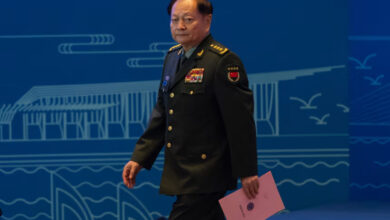Over the last few days, I’ve received a number of letters addressed to the Supreme Council of the Armed Forces (SCAF) expressing several matters of public concern. In what follows I highlight those which I found most important.
First, many people are disturbed by the renewed incidents of sectarian violence in Imbaba, which they see as a clear attempt to defeat the 25 January revolution. These people argue that even though SCAF is a temporary ruling body, it is responsible for maintaining domestic order for the time being. This is especially the case given the common view that stability and security are a necessary precondition to bring the economy back on track and pave the way toward democracy and development.
It’s not enough to be neutral in the face of those who want to harm Egypt. Traditional methods of handling sectarian conflict are inadequate. Instead, the law must be applied across the board to deter anyone from threatening Egypt’s national unity, the backbone (along with the Nile River) of national security.
Second, the widespread presence of thugs has troubled many people, especially in lower-class neighborhoods where bandits impose fines on civilians or rob them using the threat of violence. This is not an easy problem to solve. The Mubarak regime left the country with 4,000 thugs who used to work for corrupt officials in the police force as well as for ex-ruling party MPs and big businessmen involved in siphoning off public funds. These thugs now feel disenfranchised and are gradually turning against society. They’re also desperate to put their criminal capacities to use once again through their old employers who used public money to pay them. Despite the fact the SCAF has endorsed an anti-thug law it has yet to take the required steps to implement it. Those who threaten others’ safety or incite sectarian tensions must be dealt with firmly.
The minister of interior, Mansour al-Essawy, is being increasingly seen as lacking the necessary credentials to manage this difficult period. Most police officers in the Interior Ministry remain weak and cannot seem to get back to a normal work routine. They must be held accountable. These police officers should either resume their work or lose their jobs. Under the current circumstances, there is no room for leniency with those who abandon their duties and violate the oath they made when they graduated from the police academy.
Finally, I’d like to share a brief anecdote to help illustrate public anxieties about their country's security. A few days ago, Safwat Maher, and Egyptian from a village in Fayoum, came to my office and told me that his brother, Sameh, was sentenced at a military trial on 27 March for attacking a police officer. He recounted that Sameh went to Fayoum’s department of motor vehicles five days earlier to renew his motorcycle license. The police officer asked him to pay LE 500 in fees, an amount that had been set by the governor.
When Sameh inquired about the fee, the police officer shouted back and decided to confiscate his motorcycle, Sameh’s only source of income. Sameh was angered by the response and threw a water bottle, after which the police officer called the military police to arrest him. Sameh was eventually tried and sentenced to five years in prison. Maher then came crying to my office with documents to prove his story. Affirming his brother’s innocence, Maher, a student in law and sharia, expressed his hope that the ruling would be revisited.
Oddly, Maher had been attacked by armed thugs on Cairo’s ring road a few days earlier and had his cell phone and LE 800 stolen. Nobody could return Maher’s money, yet his brother was swiftly sentenced to five years in prison. Both incidents indicate serious shortcomings in Egyptian law enforcement and the provision of public security at the present time.
Translated and abridged from the Arabic Edition.




